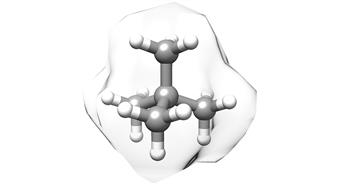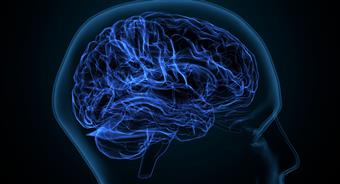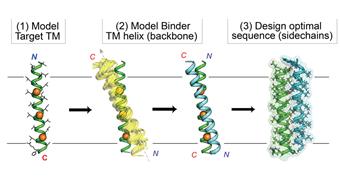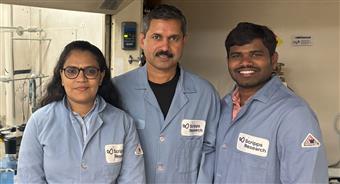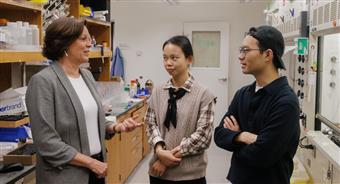
Molecules that reduce bad' gut bacteria reverse narrowing of arteries in animal study Promoting a healthy gut microbiome may be a powerful strategy for lowering cholesterol and other heart attack risk factors.
June 15, 2020
LA JOLLA, CA Scientists at Scripps Research have developed molecules that can remodel the bacterial population of intestines to a healthier state and they have shown through experiments in mice that this reduces cholesterol levels and strongly inhibits the thickened-artery condition known as atherosclerosis.
The scientists, who report their findings in Nature Biotechnology, created a set of molecules called peptides that can slow the growth of less-desirable species of gut bacteria. In mice that develop high cholesterol and atherosclerosis from a high-fat diet, the peptides beneficially shifted the balance of species in the gut microbiome, which refers to the trillions of bacteria that live inside the digestive system. This shift reduced cholesterol levels and dramatically slowed the buildup of fatty deposits in arteries symptoms that are the hallmarks of atherosclerosis.
Atherosclerosis is the condition that leads to heart attacks and strokes, the two leading causes of death among humans.
It was surprising to us that simply remodeling the gut microbiome can have such an extensive effect, says study co-senior author Reza Ghadiri, PhD, professor in the Department of Chemistry at Scripps Research.
Gut microbes shape our health
The gut microbiome, which includes hundreds of bacterial species, evolved long ago as part of a fundamental symbiosis: The bacteria get a place to live and plenty to eat, and in return they assist their animal hosts, largely by helping them digest food.
In the past two decades, these symbiotic bacteria have become a focus of intense study around the world, as scientists have discovered that the microbes in part by their production of molecules called metabolites not only help digest food, but play a role in metabolism, immunity and other important functions.
Scientists also have learned that this symbiosis can have a downside for the bacteria's human hosts. When people overuse antibiotics or consume Western diets rich in carbs, fats and sugar, the gut microbiome can be altered in ways that promote disease.
Indeed, it now appears that the increased risks of obesity, diabetes, hypertension and atherosclerosis that are conferred by the Western diet are due in part to adverse changes in the microbiome.
That recognition has led researchers to look for ways to remodel the microbiome, with the goal of rolling back those adverse changes to restore good health. Ghadiri and his team have been working on a method that involves delivering small molecules to kill or slow the growth of bad gut bacteria without affecting good gut bacteria.
Our approach, using small molecules called cyclic peptides, is inspired by nature, says co-senior author Luke Leman, PhD, an assistant professor in the Department of Chemistry at Scripps Research. Our cells naturally use a diverse collection of molecules including antimicrobial peptides to regulate our gut microbe populations.
A screening system to identify microbiome remodelers
Prior to the experiments, the team already had a small collection of cyclic peptides that had been made using chemistry techniques. For the study, they set up a screening system to determine if any of those peptides could beneficially remodel the mammalian gut microbiome by suppressing undesirable gut bacterial species.
Using mice that are genetically susceptible to high cholesterol, they fed the animals a Western-type diet that swiftly and reliably produces high blood cholesterol and atherosclerosis, as well as adverse shifts in the gut microbiome. The researchers then sampled the animals' gut contents and applied a different cyclic peptide to each sample. A day later, they sequenced the bacterial DNA in the samples to determine which peptides had shifted the gut bacteriome in the desired direction.
The scientists soon identified two peptides that had significantly slowed the growth of undesirable gut bacteria, shifting the species balance closer to what is seen in mice that are fed a healthier diet. Using these peptides to treat atherosclerosis-prone mice that were eating a high-fat Western diet, they found striking reductions in the animals' blood levels of cholesterol compared to untreated mice about 36 percent after two weeks of treatment. They also found that after 10 weeks, the atherosclerotic plaques in the arteries of the treated mice were about 40 percent reduced in area, compared to those in untreated mice.
These were really remarkable effects, Ghadiri says.
The cyclic peptides used in the study apparently interact with the outer membranes of certain bacterial cells in ways that slow or stop the cells' growth. Ghadiri and his team have been researching these peptides for years and have put together a set of dozens that show no toxicity to the cells of mammals. The molecules also transit through the gut without entering the bloodstream. In the study, the peptides were delivered to the mice in drinking water and were not associated with any adverse side effects.
Cheered by the proof-of-principle demonstration, the researchers are now testing their peptides in mice that model diabetes, another common condition that has been linked to an unhealthy microbiome.
Directed remodeling of the mouse gut microbiome inhibits the development of atherosclerosis was written by Poshen Chen, Audrey Black, Adam Sobel, Yannan Zhao, Purba Mukherjee, Bhuvan Molparia, Nina Moore, German Muench, Jiejun Wu, Weixuan Chen, Antonio Pinto, Bruce Maryanoff, Alan Saghatelian, Pejman Soroosh, Ali Torkamani , Luke Leman and Reza Ghadiri.
Funding was provided by the National Institutes of Health (R01HL118114, UL1TR001114, U5
More from Scripps
20/04/2024
New copper-catalyzed C-H activation strategy from Scripps Research Two-mode reactions inspired by human detox enzymes offer powerful new tools for drug discover...
12/04/2024
Scripps Research chemists devise easier new method for making a common type of building block for drugs Scientists transform simple linear amines into saturated...
06/04/2024
A simple, inexpensive way to make carbon atoms bind together A Scripps Research team uncovers a cost-effective method for producing quaternary carbon molecules,...
04/04/2024
Developing a vaccine for the zombie drug xylazine Scripps Research chemical biologists design an early proof-of-concept vaccine that could lead to the first...
30/03/2024
How blocking a neural receptor responsible for addiction could reduce alcohol use A Scripps Research team found that a new therapeutic that targets the kappa op...
13/03/2024
New computational strategy boosts the ability of drug designers to target proteins inside the membrane Customized-design approach could streamline the design of...
29/02/2024
Scripps Research scientists reveal how first cells could have formed on Earth New phospholipid discovery brings researchers closer to understanding how primordi...
29/02/2024
How molecular handedness emerged in early biology Scripps Research chemists fill a major gap in origin-of-life theories.
February 28, 2024
LA JOLLA, CA Mole...
22/02/2024
Snaking toward a universal antivenom Scripps Research scientists discovered antibodies that protect against a host of lethal snake venoms.
February 21, 2024
...
06/02/2024
Calibr-Skaggs announces expansion of option and license agreement with AbbVie to develop novel cell therapies for solid tumors and autoimmune diseases
AbbVie...
26/01/2024
Re-energizing mitochondria to treat Alzheimer's disease Scripps Research team restored neuron-to-neuron connections in human cells.
January 25, 2024
LA JO...
24/01/2024
100 years of Science Changing Life: Scripps Research celebrates a century of transforming human health For the last century, institute leaders and renowned scie...
23/01/2024
New technology lets researchers track brain cells' off switches The method could shed light on what goes awry in numerous brain conditions when neurons ar...
09/01/2024
Three decades of giving: Announcing the Calibr-Skaggs Institute for Innovative Medicines The ALSAM Foundation, founded by the Skaggs family, provides lasting g...
04/01/2024
Life science entrepreneur Gene Lay joins Scripps Research Board of Directors Lay, founder of the global biotech company BioLegend, brings invaluable experience ...
21/12/2023
Taming a plant-derived toxin Scripps Research team modifies the traditional poison picrotoxinin for potential neurological drugs and anti-parasite treatments. ...
19/12/2023
Scripps Research Executive Vice President Eric Topol gives TED talk on transformative power of AI in medicine Topol provides an overview of how AI models can i...
13/12/2023
New AI-powered algorithm could better assess people's risk of common heart condition Early detection of atrial fibrillation can reduce the risk of stroke an...
07/12/2023
Nanoparticle flu vaccine design shows promise in early tests Scripps Research-designed vaccine could provide broad, enduring protection against influenza A str...
16/11/2023
Numerous Scripps Research scientists named Highly Cited Researchers Clarivate's annual, global list represents researchers who have demonstrated significant...
07/11/2023
Multiple sclerosis drug invented at Scripps Research slows long-term devastating disease progression Late-breaking data reinforces the effectiveness and safety ...
05/10/2023
Keren Lasker named a 2023 Moore Inventor Fellow The prestigious award will support Lasker's inventive research in membraneless organelles and their applica...
22/09/2023
Michael Bollong named a 2023 Amgen Young Investigator The prestigious award will support Bollong's research identifying new molecular targets and therapeuti...
09/09/2023
Philip Dawson receives 2024 American Chemical Society National Award Dawson is honored with the Arthur C. Cope Late Careers Scholar Award for his foundational c...
07/09/2023
Scripps Research chemists devise a method for C-H activation of alcohols The method represents a new toolkit for making drugs and other compounds.
September 06...
31/08/2023
Scripps Research receives $1.5M to surveil infectious disease threats in wastewater Bill & Melinda Gates Foundation award to support the development of multi-pa...
16/08/2023
How cold temperatures trigger the brain to boost appetite Scripps Research scientists' discovery could lead to new weight loss and metabolic health treatmen...
08/08/2023
Human antibody that targets carfentanil, fentanyl and related opioids reverses overdose effects in preclinical study Scripps Research-developed antibody therapy...
04/08/2023
How sensory neurons impact the gut Scripps Research scientists show that the receptor PIEZO2 in sensory neurons controls gut motility and transit time, which a...
26/07/2023
AbbVie and Calibr Expand Strategic Collaboration to Advance Several Preclinical and Early-stage Clinical Assets The expanded strategic collaboration will advan...
23/07/2023
Scripps Research scientists develop AI-based tracking and early-warning system for viral pandemics Machine-learning system effectively predicts emergence of pro...
19/07/2023
Monitoring T cells may allow prevention of type 1 diabetes Scripps Research study shows that analyzing T cells in blood samples could be used to select at-risk ...
19/07/2023
Scripps Research mourns passing of leading organic chemist Albert Eschenmoser Eschenmoser pioneered key reactions in synthetic chemistry and shaped the understa...
15/06/2023
Scripps Research awarded $46.8 million by NIH to promote human health through innovative translational science and training The Translational Institute is harne...
13/06/2023
Scripps Research's Danielle Grotjahn named 2023 Pew Scholar in the Biomedical Sciences The award will support Grotjahn's study of how cells assemble the...
31/05/2023
Crossing the ring: new method enables C-H activation across saturated carbocycles Scripps Research chemists add another powerful tool to their molecular editin...
24/05/2023
Scripps Research develops behind-the-scenes tool for better biomedical data discovery The new resource makes datasets more discoverable for life science communi...
19/05/2023
Scripps Research neuroscientist Hollis Cline elected to American Academy of Arts and Sciences Cline is recognized for her discoveries about the role of sensory ...
19/05/2023
Scripps Research's Skaggs Graduate School awards doctoral degrees to 31st graduating class Commencement ceremony will be livestreamed via Zoom and on instit...
13/05/2023
A better route to benzocyclobutenes, sought-after building blocks for drugs Scripps Research chemists devise a new, C-H activation-based method for the synthesi...
09/05/2023
Renowned Scripps Research professor Jeffery Kelly elected to National Academy of Sciences Kelly's groundbreaking work on protein misfolding has led to thera...
28/04/2023
Mirror-image molecules pave new path for cancer drug discovery By comparing how mirror image versions of small molecules impact clusters of proteins, Scripps R...
22/04/2023
How alcohol consumption contributes to chronic pain A Scripps Research team showed how both alcohol intake and alcohol withdrawal can lead to increased pain and...
21/04/2023
Xin Jin receives dual awards to study autism risk genes in neurodevelopment Major grants from the National Institutes of Health and California Institute for Reg...
20/04/2023
Trim the sugar: New HIV vaccine design improves immune response Scripps Research vaccine candidate headed for clinical trials.
April 19, 2023
LA JOLLA, CA A...
18/04/2023
Therapeutic can seek and destroy potent opioid to treat overdoses Scripps Research chemists developed a new biologic to work against the synthetic opioid carfen...
07/03/2023
How heavy alcohol consumption increases brain inflammation The findings by a Scripps Research team point toward a potential new drug target for treating alcohol...
02/03/2023
Scientists find human antibodies that can block multiple coronaviruses including SARS-CoV-2 Results from a Scripps Research and UNC team pave the way for a vacc...
28/02/2023
$10 million grant funds Scripps Research Alcohol Research Center through its 50th year The five-year grant supports research into the neurobiology of alcohol us...
28/02/2023
Immune system drug shows promise in treating alcohol use disorder, a Scripps Research clinical trial reports Scientists at Scripps Research found that apremilas...
 Molecules that reduce bad' gut bacteria reverse narrowing of arteries in animal study Promoting a healthy gut microbiome may be a powerful strategy for lowering cholesterol and other heart attack risk factors.
Molecules that reduce bad' gut bacteria reverse narrowing of arteries in animal study Promoting a healthy gut microbiome may be a powerful strategy for lowering cholesterol and other heart attack risk factors.















